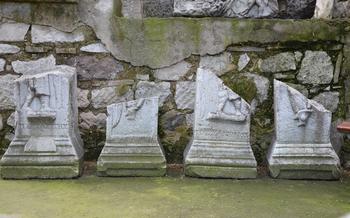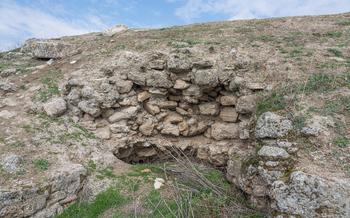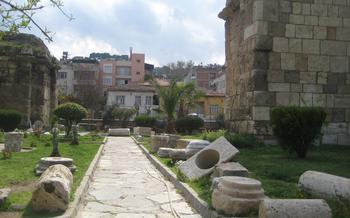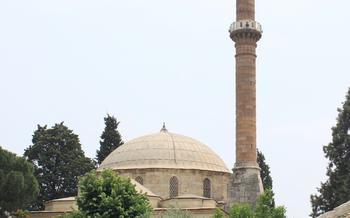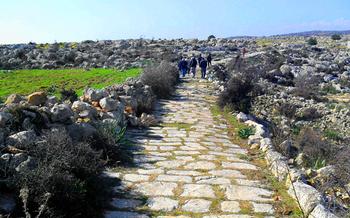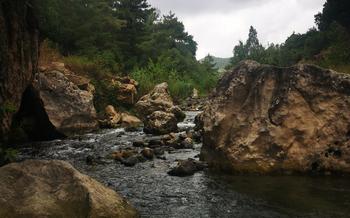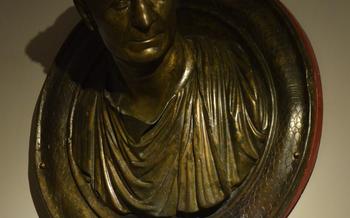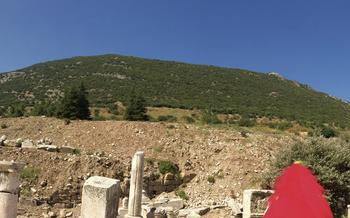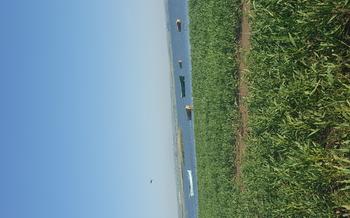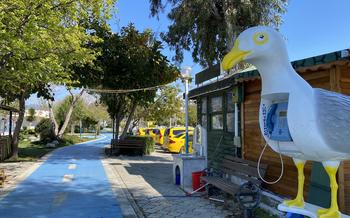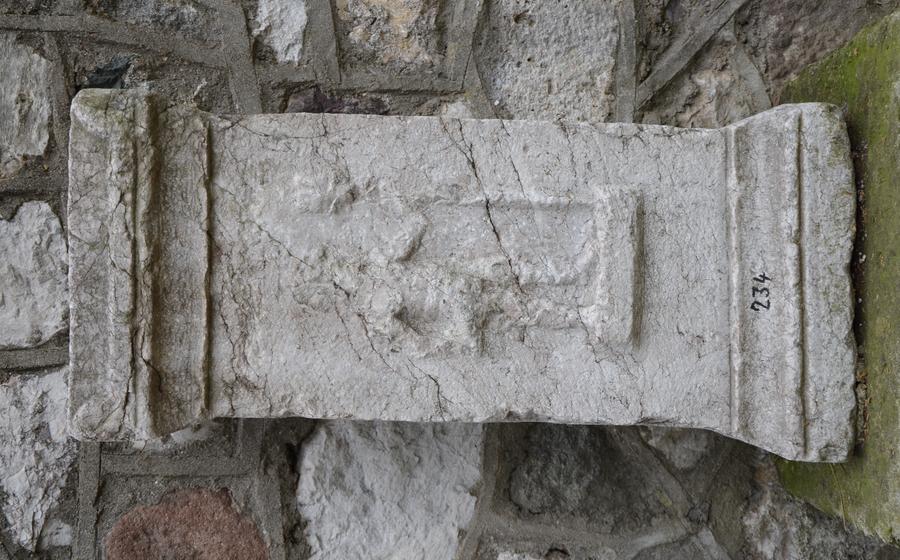
Thyateira (Tepe Mezarlığı)
- Thyateira (Tepe Mezarlığı): A Historical Overview
- Exploring the Thyateira Archaeological Site
- Location and Accessibility
- Layout of the Ancient City
- Notable Ruins and Structures
- Tips for Exploring the Site
- The Church of Thyatira: A Symbol of Early Christianity
- Thyateira's Connection to the Seven Churches of Revelation
- Discovering the Ancient Theater of Thyateira
- The Agora: Center of Trade and Social Life
- Exploring the Surroundings of Thyateira
- Local Cuisine and Dining Options
- Shopping for Souvenirs and Local Products
- Accommodation Options for Visitors
- Getting Around Thyateira: Transportation Tips
- Events and Festivals in Thyateira
- Thyateira for History Buffs and Archaeology Enthusiasts
- Insider Tip: Unveiling Hidden Gems
Thyateira (Tepe Mezarlığı): A Historical Overview
Significance of the city in the Roman Empire Thyateira, known locally as Tepe Mezarlığı, was a prominent city in the Roman Empire, renowned for its strategic location along the trade routes connecting the Aegean Sea to the interior of Anatolia. The city flourished during the Roman period, becoming a significant center for trade, agriculture, and manufacturing. Its prosperity was reflected in the construction of impressive public buildings, temples, and theaters, which showcased the city's wealth and importance.
Archaeological excavations and discoveries In recent years, archaeological excavations at Thyateira have yielded remarkable discoveries, shedding light on the city's rich history and vibrant urban life. Excavations have uncovered well-preserved ruins of temples, including the Temple of Apollo, which once stood as a testament to the city's religious devotion. The discovery of inscriptions and artifacts has provided valuable insights into the daily lives, beliefs, and practices of Thyateira's ancient inhabitants.
Status of Thyateira as one of the Seven Churches of Revelation Thyateira holds a significant place in Christian history as one of the Seven Churches of Revelation, mentioned in the Book of Revelation in the New Testament. The church in Thyateira was praised for its faith and works but criticized for tolerating false teachings. This reference in the Bible has made Thyateira a popular destination for Christian pilgrims, who seek to trace the footsteps of early Christianity and gain a deeper understanding of the city's spiritual heritage.
Exploring the Thyateira Archaeological Site
Location and Accessibility
The archaeological site of Thyateira is situated in the heart of modern-day Akhisar, a city in the Manisa province of Turkey. The site is easily accessible by public transportation or by car. Visitors can take a bus to Akhisar from the nearby city of Manisa or rent a car and drive along the well-maintained roads.
Layout of the Ancient City
Thyateira was a significant city in the Roman Empire, and its ancient layout reflects its importance. The city was built on a hilltop overlooking the surrounding countryside, and its streets were laid out in a grid pattern. The city was divided into several districts, each with its own distinct function.
Notable Ruins and Structures
Among the most notable ruins in Thyateira are the remains of the ancient city walls, the agora (marketplace), the theater, and the Church of Thyatira. The city walls were once over 3 kilometers long and featured several gates and towers. The agora was the center of commercial activity and social life in the city, and it was surrounded by shops, warehouses, and public buildings. The theater was used for performances and public gatherings, and it could accommodate up to 5,000 spectators.
Tips for Exploring the Site
The best time to visit the Thyateira archaeological site is in the spring or fall when the weather is mild. Visitors should wear comfortable shoes and clothing as they will be doing a lot of walking. It is also advisable to bring a hat, sunscreen, and water, especially during the summer months.
The Church of Thyatira: A Symbol of Early Christianity
Standing as a testament to the early days of Christianity, the Church of Thyatira holds immense significance in the history of the faith. Built in the 4th century AD, this sacred edifice served as a prominent center of worship and community for the early Christian population of Thyateira. Its architectural features, intricate designs, and discovered artifacts provide valuable insights into the development of Christianity in the region.
The church's impressive structure features a spacious nave, supported by rows of elegant columns, leading to a raised sanctuary. The apse, where the altar once stood, is adorned with intricate mosaics depicting biblical scenes and symbolic motifs. These mosaics, along with other decorative elements, offer a glimpse into the artistic and religious traditions of the early Christian community.
Archaeological excavations at the site have unearthed numerous artifacts, including inscriptions, pottery fragments, and religious objects. These discoveries shed light on the daily practices and beliefs of the early Christians in Thyatira. Inscriptions found within the church provide valuable information about the organization and leadership of the congregation, as well as their adherence to Christian doctrines.
The Church of Thyatira played a pivotal role in the spread of Christianity throughout the region. As one of the Seven Churches of Revelation, it received a special message from the Apostle John in the Book of Revelation. This message, while containing both praise and criticism, underscores the importance of the church in the early Christian world.
Today, the Church of Thyatira stands as a reminder of the deep roots of Christianity in Turkey. It serves as a symbol of the faith's resilience and its ability to endure through the centuries. Visitors to the site can immerse themselves in the history and significance of this sacred place, gaining a deeper appreciation for the role of Thyatira in the development of Christianity.
Thyateira's Connection to the Seven Churches of Revelation
The Book of Revelation, found in the New Testament of the Christian Bible, holds significant importance for many believers. Within this book, seven churches are mentioned, including the church in Thyateira. These churches represent communities of faith that existed during the first century A.D. in various regions of the Roman Empire.
Thyateira, as one of the Seven Churches of Revelation, is mentioned in Chapter 2, verses 18-2In this passage, a message is addressed to the church in Thyateira, commending them for their love, faith, and service but also criticizing them for tolerating false teachings and idolatry.
The interpretation of the message to the church in Thyateira has been a subject of theological debate and discussion. Some scholars interpret the message as a warning against spiritual complacency and the need for repentance. Others see it as a symbolic representation of the challenges and temptations faced by the early church in a pagan society.
For modern-day Christians, the message to the church in Thyateira serves as a reminder of the importance of maintaining faithfulness and vigilance in their spiritual journey. It encourages believers to stand firm against false teachings and influences that may lead them astray. The message also highlights the need for spiritual discernment and the rejection of idolatry in all its forms.
The connection between Thyateira and the Seven Churches of Revelation adds to the significance of this ancient city for Christian pilgrims and travelers. Visiting the ruins of Thyateira allows visitors to connect with the early history of Christianity and reflect on the messages and lessons contained in the Book of Revelation.
Discovering the Ancient Theater of Thyateira
Location and Description:
Located in the heart of the ancient city, the theater of Thyateira stands as a testament to the city's cultural and artistic heritage. This impressive structure is situated on a natural slope, providing spectators with breathtaking views of the surrounding landscape. With its well-preserved seating tiers and stage area, the theater offers a glimpse into the vibrant entertainment scene of ancient Thyateira.
Architectural Features and Design:
The theater's design showcases the architectural prowess of the Roman Empire. Constructed using local stone, the theater features a horseshoe-shaped auditorium with a capacity of approximately 3,000 spectators. The seating tiers rise in concentric rows, providing excellent acoustics and unobstructed views of the stage. The stage area is adorned with intricate carvings and sculptures, hinting at the elaborate performances that once took place here.
Purpose of the Theater and Types of Performances Held:
In ancient times, the theater served as a hub for entertainment and cultural expression. It hosted a variety of performances, including theatrical productions, musical concerts, and gladiatorial contests. Plays by renowned Greek and Roman playwrights were performed on this stage, transporting audiences to distant lands and captivating their imaginations. The theater also served as a venue for religious ceremonies and civic events, further solidifying its importance in the life of the city.
Current State of the Theater and Its Significance:
Today, the theater stands as a testament to Thyateira's rich past. Although partially restored, it retains its original charm and grandeur. Visitors can explore the seating tiers, imagine the vibrant atmosphere of ancient performances, and admire the intricate carvings that adorn the stage. The theater's enduring presence serves as a reminder of the city's cultural heritage and its significance as a center of entertainment and artistic expression in the ancient world.
The Agora: Center of Trade and Social Life
The Agora was the bustling heart of ancient Thyateira, serving as a vibrant marketplace and a lively social hub. Located near the center of the ancient city, the agora was a spacious, open area surrounded by colonnaded walkways lined with shops, stalls, and workshops. Here, merchants from across the region gathered to trade their wares, while locals and visitors mingled, conducting business, exchanging news, and engaging in lively debates.
Archaeological excavations in the agora have unearthed a wealth of artifacts, including coins, pottery, and inscriptions, shedding light on the diverse range of goods that were traded in Thyateira. From locally produced textiles and pottery to imported spices and exotic goods, the agora was a testament to the city's flourishing trade and commerce.
Beyond its commercial significance, the agora also played a crucial role in the social and cultural life of Thyateira. It was a place where people came together to socialize, exchange ideas, and participate in public events. Statues and monuments adorned the agora, honoring local dignitaries and commemorating important events in the city's history.
Today, visitors to Thyateira can still admire the remains of the agora, including the foundations of shops and colonnades. While much of the ancient marketplace has disappeared over time, the agora continues to evoke the vibrant spirit of ancient Thyateira, reminding visitors of the city's rich history and its enduring legacy as a center of trade and social interaction.
Exploring the Surroundings of Thyateira
Beyond the city walls, Thyateira's surroundings offer a wealth of attractions for curious travelers. Immerse yourself in the natural beauty of Mount Spil. Hike through lush forests, admire cascading waterfalls, and take in breathtaking panoramic views. Discover ancient ruins and historical sites scattered throughout the region, such as the Byzantine monastery of Panagia Gorgoepikoos. Embark on a scenic boat trip along the Gediz River, passing through picturesque landscapes and charming villages. Explore the nearby city of Manisa, with its vibrant atmosphere, modern amenities, and cultural landmarks. Whether you seek adventure, history, or relaxation, Thyateira's surroundings promise a fulfilling and diverse experience.
Local Cuisine and Dining Options
Thyateira's culinary scene is a delightful blend of traditional Turkish flavors and regional specialties. Indulge in the aromatic kebabs, succulent grilled meats, and freshly baked pide, all staples of Turkish cuisine. Don't miss the chance to savor the local specialty, "Manisa Kebabı," a mouthwatering dish of tender lamb cooked to perfection and served with a tangy tomato sauce.
For an authentic dining experience, venture into the heart of the city and explore the vibrant local markets. Sample the colorful array of fresh fruits, vegetables, and spices, and engage with the friendly vendors who are passionate about their produce.
When it comes to restaurants, Thyateira offers a diverse range of options to suit every taste and budget. From cozy family-run eateries to upscale establishments, there's something for everyone. Be sure to try traditional dishes like "Manisa Mantısı," delicate dumplings filled with minced meat and topped with a yogurt sauce, or "Girit Ezmesi," a flavorful spread made from roasted red peppers, walnuts, and spices.
For those with dietary restrictions, vegetarian and vegan options are becoming increasingly available in Thyateira. Look for restaurants that offer "zeytinyağlı yemekler," a variety of vegetable dishes cooked in olive oil, or "Mercimek Çorbası," a hearty lentil soup.
Dining in Thyateira is not just about satisfying your taste buds; it's a cultural experience that allows you to connect with the warmth and hospitality of the local people. Engage in conversations with fellow diners, share stories, and learn about the culinary traditions that have been passed down through generations.
Shopping for Souvenirs and Local Products
Discover the Treasures of Thyateira's Local Markets
When visiting Thyateira, immersing yourself in the local culture through shopping is a must. The city offers a vibrant shopping scene, where you can find unique souvenirs and local products that encapsulate the essence of this ancient land.
Explore the bustling markets and bazaars, where vendors display an array of handcrafted items, from intricate carpets and textiles to exquisite pottery and jewelry. Haggling is not only acceptable but expected, so don't be afraid to put your bargaining skills to the test.
Must-Buy Souvenirs
Handwoven Carpets: Renowned for their intricate designs and vibrant colors, Thyateira's carpets are a testament to the city's rich textile tradition.
Ceramic Pottery: Discover a variety of hand-painted ceramics, from decorative plates to intricate vases, each showcasing the artistry of local craftsmen.
Silver Jewelry: Thyateira's silversmiths create beautiful jewelry pieces, from delicate necklaces to ornate earrings, inspired by ancient motifs and designs.
Olive Oil and Local Delicacies: Take home a bottle of Thyateira's renowned olive oil, produced from the region's bountiful olive groves. Don't forget to sample the local honey, jams, and spices as well.
Supporting Local Artisans
By purchasing souvenirs from local artisans, you not only take home a piece of Thyateira, but also contribute to the preservation of traditional crafts and support the livelihoods of local communities.
Tips for a Rewarding Shopping Experience
- Be prepared to haggle: Bargaining is a way of life in Thyateira's markets. Don't be afraid to offer a lower price and see where the negotiation takes you.
- Shop early: The best time to visit the markets is early in the morning, when the vendors are fresh and the crowds are smaller.
- Carry cash: Many vendors in Thyateira prefer cash, so be sure to have some on hand.
- Ask for recommendations: Don't hesitate to ask locals or your hotel concierge for recommendations on where to find the best souvenirs.
Accommodation Options for Visitors
Thyateira offers a range of accommodation options to suit different budgets and preferences. For those seeking comfort and convenience, several hotels provide modern amenities and easy access to the city's attractions. Budget travelers can opt for cozy guesthouses or hostels, offering a more affordable and social experience. For a truly immersive stay, consider booking a room in a traditional Ottoman-style house, allowing you to step back in time and embrace the city's rich history.
To find the best deals, it's advisable to book your accommodation in advance, especially during the peak tourist season. Online booking platforms and travel agencies can help you compare prices and read reviews from previous guests. If you're flexible with your dates, consider visiting during the shoulder seasons (spring and autumn) to avoid the crowds and take advantage of lower rates.
For those seeking a unique and memorable experience, consider staying in a restored historical mansion or a charming boutique hotel. These accommodations often offer stunning views of the city and provide a glimpse into Thyateira's past. They may also incorporate traditional elements into their design, allowing guests to immerse themselves in the city's heritage.
Getting Around Thyateira: Transportation Tips
Navigating Thyateira is a breeze with a range of transportation options available. The city's compact size makes it easy to explore on foot, allowing you to soak in the historical ambiance and vibrant street life. For longer distances or venturing beyond the city center, public transportation is reliable and affordable. Buses and minibuses connect various parts of the city, and taxis are readily available for hire.
For those seeking independence and flexibility, renting a car is a great option. Numerous car rental agencies are located in the city, offering a variety of vehicles to suit your needs and budget. Remember to carry your international driver's license and be prepared for right-hand traffic. If you prefer a more personalized experience, hiring a taxi for the day or a specific tour is a convenient choice. Taxis are generally affordable and can be arranged through your hotel or on the street.
Cycling enthusiasts will delight in exploring Thyateira on two wheels. The city's relatively flat terrain and designated bike lanes make it a cyclist's paradise. Several bike rental shops offer a range of bicycles, from city cruisers to mountain bikes, allowing you to explore at your own pace.
Safety is a top priority when navigating Thyateira. Whether on foot, by bicycle, or in a vehicle, be mindful of your surroundings and follow local traffic regulations. Designated pedestrian crossings are available at major intersections, and it's advisable to use them whenever possible. When cycling, wear a helmet and be cautious of other vehicles, especially on busy roads.
Events and Festivals in Thyateira
Thyateira's rich history and cultural heritage are celebrated through a variety of annual events and festivals that offer visitors a chance to immerse themselves in local traditions and festivities. The most notable event is the Thyateira Festival, held every year in May to commemorate the city's founding and its ancient heritage. The festival features traditional music and dance performances, historical reenactments, art exhibitions, and a vibrant street fair.
Other popular events include the Thyateira Wine Festival, held every September, showcasing the region's renowned winemaking tradition. Visitors can sample local wines, learn about winemaking processes, and enjoy live music and entertainment in a festive atmosphere. The Thyateira Olive Festival, held in November, celebrates the city's olive groves and olive oil production. Visitors can taste freshly pressed olive oil, savor traditional dishes made with olives, and participate in olive-picking activities.
For those interested in the city's religious heritage, the Thyateira Christian Festival, held in June, offers a unique opportunity to explore the city's early Christian history. The festival features religious processions, church services, and lectures on the history of Christianity in Thyateira.
Planning your trip around these events is highly recommended, as they provide a glimpse into the vibrant culture and traditions of Thyateira. Whether you're interested in history, wine, food, or religious heritage, there's an event in Thyateira that will capture your interest and leave you with lasting memories.
Thyateira for History Buffs and Archaeology Enthusiasts
If you're a history buff or an archaeology enthusiast, Thyateira promises an unforgettable journey through time. Delve into the city's rich past at the Thyateira Archaeological Museum, showcasing artifacts and exhibits that bring its history to life. Explore the ancient theater, where performances once captivated audiences, and immerse yourself in the daily life of Thyateira's inhabitants as you wander through the ruins of the agora, its bustling marketplace.
Uncover the secrets of the Seven Churches of Revelation by visiting the Church of Thyatira, a testament to the city's significance in early Christianity. Discover the hidden gems of Thyateira by venturing beyond the main tourist spots. Explore the lesser-known ruins, such as the Byzantine fortifications or the remains of an ancient aqueduct, and immerse yourself in the city's rich history.
Enrich your experience by joining organized tours or guided walks led by local experts. These knowledgeable guides will provide in-depth insights into Thyateira's past, allowing you to uncover its hidden stories and secrets. Immerse yourself in the local culture by interacting with friendly locals, asking for recommendations, and exploring the city's vibrant atmosphere.
Enhance your understanding of Thyateira's history by delving into the works of renowned historians and archaeologists. Recommended books and resources will provide a deeper context and perspective on the city's significance. Create your own unique Thyateira adventure by combining your passion for history with the thrill of discovery.
Insider Tip: Unveiling Hidden Gems
Beyond the well-known landmarks and attractions, Thyateira holds a treasure trove of hidden gems waiting to be discovered. Venture off the beaten path and explore the city's lesser-known corners to uncover its true essence.
-
Stroll along the Panayır Stream: Take a leisurely walk along the serene Panayır Stream, which meanders through the city, offering picturesque views and a tranquil atmosphere.
-
Visit the Kurşunlu Mosque: Step into the historic Kurşunlu Mosque, a hidden gem of Ottoman architecture, with its intricate tilework, elegant minaret, and peaceful courtyard.
-
Explore the Old City Walls: While most visitors flock to the ancient city walls, venture to the lesser-known Old City Walls, which offer panoramic views and a glimpse into Thyateira's rich history.
-
Discover the Thyateira Olive Oil Museum: Immerse yourself in the local culture and tradition at the Thyateira Olive Oil Museum, where you can learn about the production and significance of olive oil in the region.
-
Take a Cooking Class: Learn the secrets of Turkish cuisine by enrolling in a cooking class, where you'll discover the art of preparing traditional dishes using fresh local ingredients.
Remember, the best way to uncover Thyateira's hidden gems is to interact with the locals. Ask for recommendations, engage in conversations, and be open to unexpected discoveries. Let your curiosity guide you as you create your own unique Thyateira adventure.
